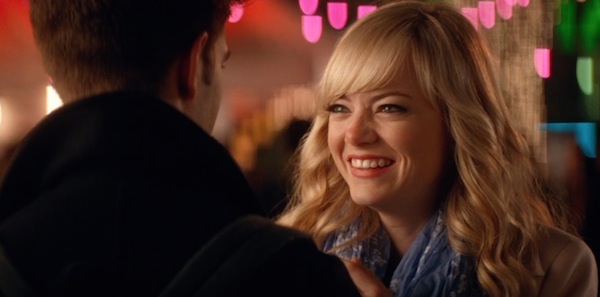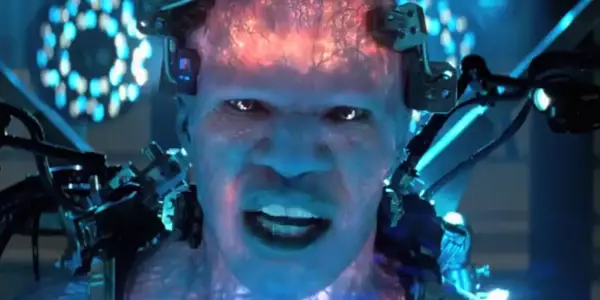THE AMAZING SPIDER-MAN 2: Never Mind The Haters, Here’s A Positive Review

Jeff is a firm believer in developing well-rounded interests. Along…
For anyone who hasn’t noticed yet, The Amazing Spider-Man 2 is getting destroyed by critics.It’s currently got a 54 percent on Rotten Tomatoes. Not only is that nearly 20 points down from the first installment, it’s less than the critically reviled Spider-Man 3 or X-Men: The Last Stand.
Our own Manon de Reeper gave the new flick a pitiable 5.5/10, saying that it “borders on all-round ridiculousness.”
As an unapologetic fan of the first Amazing Spider-Man (you can read my review here), I was disappointed, but not altogether surprised by early reactions. Sequel slump is a common thing, especially when you bring in the reigning kings of mediocre summer blockbusters, Alex Kurtzman and Roberto Orci, to handle scripting duties.
By about 15 minutes into the movie, though, I began to suspect that I might actually end up being among a very, very small minority of critics who had fun with this movie. Now, a week or so later, having had time to mull things over, I’d go even farther with that: some legitimate flaws notwithstanding, for my money, this could be one of the best superhero adaptations to date.
Where other critics have it partially right
One of the only things that critics seem able to agree on is that Andrew Garfield and Emma Stone have great onscreen chemistry as Peter Parker and Gwen Stacy.
A lot of reviews also praise their individual performances (usually as a way to preface some negative aspect of the film: “…but nothing could save dialogue this bad!”), but even in praising the two leads, people aren’t giving them – or director Marc Webb – enough credit.
First of all, let’s be honest here: this portrayal of Peter and Gwen is undoubtedly the best onscreen romance in any superhero movie made so far. No other relationship comes close. A big part of that is, again, the chemistry between the two leads. Garfield and Stone suck you in. But it also has to do with the amount of time invested in making sure their romance feels genuine.

Building on the first movie, a sizable amount of TASM2’s runtime is devoted to just hanging out with the two of them.
This allows for real dramatic tension with real stakes later on – something that most other superhero love stories only ever pretend at (cough*Wolverine and Jean Grey*cough).
That’s a big deal for a Spider-Man movie. I hope people realize that because, to a greater extent than most heroes, Spidey’s relationships are what define him.
The fact that the filmmakers completely nail that aspect of the character – that people care enough about Peter and Gwen’s love story that even though practically every scene Gwen Stacy’s in and all the little details like costuming, locations, etc. and even the trailers point to a specific fate for her, people still hold out hope for a happy ending – is huge. That alone almost justifies the existence of this iteration of Spider-Man, since it’s something Sam Raimi’s Spider-Man trilogy notably failed at.
Likewise, it’s not just that Andrew Garfield is good as both Peter and Spider-Man. I would argue that no other actor cast in a superhero movie has embodied his or her character the way they’re portrayed in the comics as perfectly as Garfield does.
Robert Downey Jr. as Iron Man? He’s amazing. But find me a pre-RDJ comic where Tony Stark is anything like how he’s portrayed in 2008’s Iron Man. Downey invented that character pretty much whole cloth, which is impressive for different reasons.
Garfield, on the other hand, is everything the ideal Spider-Man should be. Physically, he’s spot on, and the new duds with the big white eyes and the iconic red-on-blue design really do a lot to capture that classic Spider-Man vibe.
More importantly, though, he just gets the tone of the character – the playfulness, the jokes, the fact that he’s that old-school kind of hero who literally saves cats from trees.
Garfield himself put it nicely in an interview with HitFix where he described Spider-Man as being “all about the small moments.” That comes through in his performance in a way that it never did for Tobey Maguire’s Spider-Man.
Where other critics get things mostly wrong
Oof, where to begin? One of the things that’s striking to me about the critical reaction to TASM2 is how the complaints seem to be all over the map – and, sometimes, mutually contradictory.
About half the reviews I’ve read seem to think the problem with it is that Webb spends the entire movie setting up the villains for spin-offs and sequels instead of focusing on the main plotline; the other half argue the opposite, that the villains feel shoehorned in and woefully underdeveloped, as if they were last-minute, studio-mandated additions a la Venom in Spider-Man 3.
Some criticize the inclusion of Paul Giamatti as the Rhino; others lament the fact that he’s only onscreen for about four minutes total. Some love Dane DeHaan’s Green Goblin; others… don’t.
I guess what’s mostly consistent, though, is that, for wildly different reasons, nobody’s happy with the bad guys.
I’m not going to say I loved everything to do with them, either. Just like every superhero movie outside of the Nolan Batman films, the villains are under-realized next to the protagonists. That’s a problem that should be corrected across the genre, but TASM2 is by no means the worst offender.
In fact, in that regard, it’s a huge improvement over its predecessor, and it fares much better than other, more critically acclaimed superhero movies like The Avengers.
Unfortunately, I think people are missing some of the most interesting things about the villains here. Electro – a low-rent character in the comics if ever there was one – is given a page-one rewrite that turns him into way more than just your typical baddie. Instead, he’s portrayed like something straight out of a horror movie – a Frankenstein’s monster/ghost hybrid (with a touch of Dr. Manhattan thrown in).
Just check out Zelda Rubinstein‘s explanation of paranormal entities from Poltergeist and tell me there aren’t some nifty parallels.

To prove that wasn’t some happy coincidence on the part of the filmmakers, in that same interview I mentioned above, Garfield refers to Electro as a “mass-minded, fear-based consciousness.” Again, more “psychic stain” than supervillain – but no review I’ve seen has mentioned anything like that.
Electro’s design is also pretty fascinating. Visually, his jellyfish-like translucent blue skin is just cool to look at, and in terms of sound design, the filmmakers were clearly having a blast with him. Everything from Jamie Foxx’s distorted, feedback-y vocal frying to the whispery, schizophrenic rapping in Hans Zimmer and Co.’s IDM-influenced score – a literal portrayal of the voices in Max Dillon’s head – is all operating on a completely different level, at least in terms of creativity, than the bland bad guys audiences are used to seeing.
I don’t have as much positive stuff to say about DeHaan’s Goblin. He’s barely in the movie – something I have no problem with as I expect we’ll see him pop up again soon in a more substantive role.
As Harry Osborn, though, DeHaan is perfect, providing a nice dark side/light side counterpoint to Garfield’s idealistic Peter. But nobody really seems to be talking about that, either .
Problematic stuff
I could go on trying to address each individual criticism I’ve run across with this movie, but beyond being an exercise in futility, I don’t want to give the impression that I think it’s entirely flawless.
It isn’t. Not by a long shot.
For example, while I wouldn’t go so far as to call it xenophobic, one creative choice I won’t defend is the portrayal of Dr. Kafka (Marton Csokas). I think I understand the line of thinking that may have led to Csokas’ Mel Blanc-vintage German mad scientist, particularly if you take into account all the nods to classic horror movie stuff with Electro (reinforcing the Frankenstein’s monster parallels). But that doesn’t change the fact that it’s two-dimensional, clichéd, and extremely reductive.
All the more so since the (female) Dr. Kafka that appears in the comics, one of Spidey’s longtime allies, was based on a real psychiatrist named Dr. Krayda Kafka, who, I think it’s safe to assume, did not perform insane experiments on her patients.
TASM2 is also not without it’s share of cornball moments, some of which play better than others – although none are as bad as the equivalent scenes in Raimi’s Spider-Man movies.
I wonder, though, if one of TASM2’s biggest problems might not have been the decision on Sony’s part to announce a Sinister Six movie before audiences even had a chance to take this one in.
That announcement seems to have had the unanticipated effect of priming critics and audiences to view this movie as a starting point for an Avengers-style mega-franchise as opposed to a cohesive film in its own right.
Whether or not the mega-franchise part of TASM2 actually pans out, it doesn’t change the fact that I don’t think that’s how it plays. I never got the feeling, as some critics have claimed, that the whole movie was more concerned with setting up spin-off franchises than telling its own story.
Rather, what I would say could be the problem people are mistaking for that, is that TASM2 does feel a lot like the middle film in a trilogy. Just like Empire Strikes Back and The Two Towers, the plotting and structure don’t hold up as well unless you take into account that it’s only part of an ongoing story.
Different strokes
It’s a weird feeling for me as a critic to be this out of step with, seemingly, the vast majority of people.
I’m not going to argue that everyone else is wrong, but for whatever reason, TASM2 must have clicked for me in a way that it didn’t for a lot of other people.

The only other professional review that I’ve come across that seems to echo my own sentiments was one by Marvelous Da7e of LatinoReview.com, who compared the movie to a dubstep track, saying that, even though for a lot of people it’s just going to seem like noise, for those who get “key into” it, it’ll blow you away.
Having “keyed into it” myself – and having seen so many other people who, obviously, didn’t – I’d say that’s a very apt comparison.
Elements that made total sense to me and which I’ve talked about to other people as some of the highlights of the film – the action, the music, the love story, etc. – are the exact things that I later see getting lambasted by critics whose opinions I typically share and/or value.
Ultimately, though, I feel that this film is getting a short shrift perhaps because it works primarily as an adaptation of a comic book – something that very few other superhero movies actually attempt to be.
Fans of Spider-Man, I think, will appreciate how faithful it is to the spirit of the source material. Although it does have problems, it successfully translates the core elements of the character and the comics themselves to the big screen with the kind of visual flare and creativity that fans have been dreaming of for decades.
TASM2 portrays Spider-Man as Spider-Man. It doesn’t apologize for the overly comic book-y elements or the melodrama or the colorful characters or the big, fun action set pieces. It embraces all of that, and it does it in service of one of the defining stories in Spider-Man comic history.
So what did you think of The Amazing Spider-Man 2? Good? Bad? Amazing…? Let us know in the comments!
Does content like this matter to you?
Become a Member and support film journalism. Unlock access to all of Film Inquiry`s great articles. Join a community of like-minded readers who are passionate about cinema - get access to our private members Network, give back to independent filmmakers, and more.
Jeff is a firm believer in developing well-rounded interests. Along with watching movies, he also reads books he thinks could be adapted into movies and even, occasionally, watches TV. Right now, he is hard at work finishing up a degree in humanities and history and resides near the cultural mecca of Orlando, Florida, with his wife and two dogs. He’s also a regular contributor to the Deseret News and a wannabe food critic.













